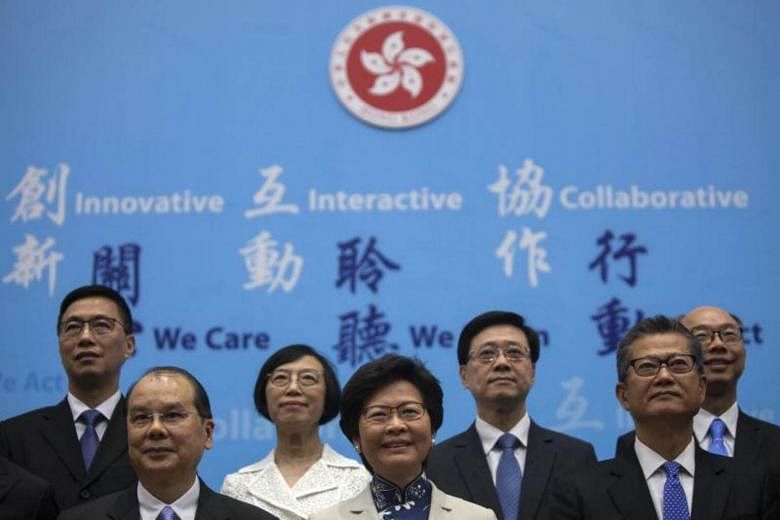Hong Kong's incoming chief executive Carrie Lam unveiled her full Cabinet line-up on Wednesday (June 21) after her nominations were approved by Beijing.
The name list, which comprises mostly of incumbents, was no surprise to the city's political observers.
The top three heavyweights - Chief Secretary Matthew Cheung Kin Chung, Financial Secretary Paul Chan Mo Po and Justice Secretary Rimsky Yuen Kwok Keung - will continue in their current posts after July 1.
While the rest of the positions were filled with incumbents, deputy ministers and veteran civil servants, Mrs Lam, 60, managed to recruit Democratic Party founding member Law Chi Kwong, 63, to head the labour bureau.
Mrs Lam, who will be sworn in on July 1 as the city's first female Chief Executive, said at a press conference that her new team is "passionate, capable, committed" and "they all agree with my new style of governance".
She also stressed the need to be innovative in formulating new policies amid a fast-changing environment.
She declined to reveal if Beijing has rejected any potential candidates, but said that she nominated all 21 members and her nominations were "supported by Beijing".
During her victory speech on March 26, Mrs Lam had vowed to introduce new blood in her team and attract more women to politics.
The task is obviously much harder than she thought as Wednesday's line-up showed Dr Law as the only "new blood" and Professor Sophia Chan Siu Chee as the only female minister.
Dr Law, an associate professor of social work with the University of Hong Kong, is the second pro-democracy member to join the administration since Hong Kong was returned to Chinese sovereignty in 1997, after outgoing housing minister Professor Anthony Cheung Bing Leung.
On Tuesday (June 20), Dr Law withdrew from his party in order to take up the new post.
While some people may see Dr Law joining the government as a sign of Beijing's tolerance of the pan-democratic camp, political analysts do not think Dr Law would be able to have much impact in an administration dominated by incumbents and veteran civil servants.
In May, Democratic Party chairman Wu Chi Wai told reporters that he does not think the split in society can be fixed immediately by having a democrat join the government.
Mrs Lam had wanted to reach out to talents from across the political spectrum as she vowed to unite the highly split society.
But analysts said Hong Kong's current political climate would have put off some potential candidates.
"Most people would have realised that Beijing will squeeze Hong Kong tight in enacting (security law) Article 23 and clamping down on the pro-independence movement, further constricting the high autonomy in Hong Kong. Lam's administration has to toe the line of Beijing. I think eligible people might have second thoughts," political analyst Willy Lam told The Straits Times.
"Because 'one country, two systems' has deteriorated in Hong Kong, there's a reluctance to join the government."
When Hong Kong was returned to Chinese rule on July 1, 1997, Beijing promised to let Hong Kongers run the city, which was to enjoy a high degree of autonomy under the formula of 'one country, two systems'.
However, incidents such as the disappearance of five booksellers in Hong Kong, only to later resurface in China, and Beijing's interpretation of Hong Kong's Basic Law have led to fears that Beijing is tightening its grip on the city.
With the top three positions filled by incumbents from outgoing Chief Executive Leung Chun Ying's administration, political analyst Lam said there might be a continuation of the unpopular Leung's policies even as the "new team" assumes office on July 1.


